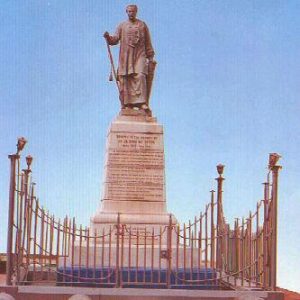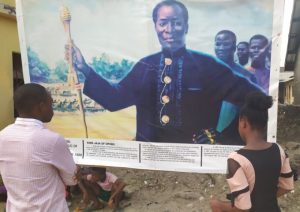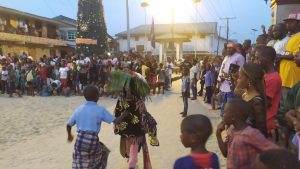Picturesque houses, child masquerades, waves crashing onto the island shore and statues of a once great king. Opobo kingdom is simply a place you have to see to believe.
“Hesh! Hez!” I had heard the beckoning cries but I did not heed them. “After all, nobody knows me here”, I thought to myself. Plus, I wasn’t doing anything wrong. “Hesh!” the voice persisted. I turned, out of curiosity more than anything else.”Come down from that place!” the middle aged man said, scowling mildly at me. The evil spirit following me went, “And, if you don’t come down nkorr?”. But, I resisted the spirit and gently, stepped down.

I’d been staring up at the statue of King Jaja of Opobo thinking to myself that good old Jaja was a beauty, dashing, a true Adonis. I’d been asked to step down though, so I could no longer read what was written on the imposing statue which was my aim when I stepped on the about 5cm? high platform surrounding the statue. My colleagues, two males were comfortably standing where I’d been asked to step down, taking photographs. It couldn’t be a strangers thing because only one of them is Opobian. “You’re wearing a dress!” the Opobian said to me, in reply to my perplexity. “Oh! It’s because I’m female is why!” Besides the sexism, Opobo it’s a land rich in culture and tradition, perhaps even more than most.

Opobo, is, perhaps, most well known for its legendary King, “a king in word and in deed” as is written on his statue, King Jaja of Opobo. Remember the legendary stubborn King who defied the British until they had to cart him away? Yes! That one. I also got to realize that he’s also quite dashing too!
“Look at what that boy is going to do” our guide told us. We’d been looking at the entrance to King Jaja’s palace which featured benches where old men lounged. We watched the youngster walk up to the entrance, and deliberately, but unconsciously, step OVER the threshold. “You also do not wear your cap to go through the entrance” he continued, further confusing us. I thought it was just a palace thing until I noticed the trend all over town. Most compounds have such entrance archways where you step over the threshold and take off your caps before entering. In addition to entrance archways, most compounds have flags and symbols or totems if you like. Each compound also declares itself by names boldly written on the archways. Chief Preye Pepple- Jaja for example.
Opobo is a beautiful town. Streetlights line the sea shore making for quite an inviting sight from the bank of the sea shore by Uta Ewa for example. “Welcome to the ancient town of Opobo!” is one of the first things you see when you come off shore. Beautiful houses litter the island and you can basically smell all that Rivers State oil money! Opobo has a pattern of power supply unlike any I’ve seen anywhere. They have some sort of central generator that powers the entire community without charge. During the yuletide, we were told that power is supplied from 6 am to 6 pm everyday.
Opobo,is however, not so beautiful that you lose sight of its Nigerianess. Latrines are common. You know the kind where children squat on raised platforms, their anuses pointing to sea or some tepid body of green smelly water? Yes! That one! Latrines are popular in Opobo and we came across one being built. In the absence of proper drainage, green smelly water gets clogged up in the gutters, and the slimy tentacles of putridity climb up your nostrils.
Another idiosyncracy of Opobo is the preference of what I would tag walkways instead of roads. Raised platforms of concrete snaking across town serve as roads. Opobo, like Rivers State bear peculiar names such as Fynebone, Dappa and even Christmas!
Opobo is replete with small kiosks, you wonder who’s buying and who’s selling, a phenomena that says a lot about the industrious nature of the people. Fishing is prevalent, and so, is boatmaking, an intricate task requiring finesse and dexterity, a lifetime trade, as we learnt from Christmas, a boat maker.

I’ve never seen a land so in touch with it’s culture and tradition such that even little children (and, when I say, children, I mean little boys, it’s a means world after all.) assume the form of ancestral spirits. Little boys wear dreaded masks as they strut the strut of the gods with pride, fellow boys trailing him as they chase little girls who run and scream like frightened chickens.
Ayim is a masquerade of Opobo that walks around with a bag of sand hidden somewhere on his person; sand, that he liberally pours on passers-by as the spirit leads.

It’s you’re coming from Akwa Ibom, Uta Ewa in Ikot Abasi is a 15 minute journey by sea. Going in a boat adds a whole new dimension to your travel.
“Farewell to the ancient town of Opobo!” is one of the last things you see as you leave Opobo, the home of King Jaja of Opobo!


